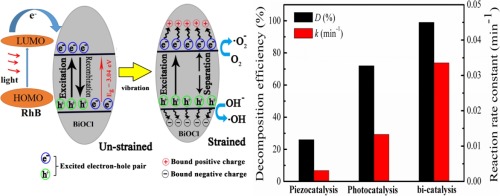Chemosphere ( IF 8.1 ) Pub Date : 2019-04-19 , DOI: 10.1016/j.chemosphere.2019.04.121 Muhammad Ismail , Zheng Wu , Luohong Zhang , Jiangping Ma , Yanmin Jia , Yongming Hu , Yaojin Wang

|
In this work, it is found that the hydrothermally-synthesized bismuth oxychloride (BiOCl) can behave both the piezocatalysis and photocatalysis for the rhodamine B dye decomposition. ∼99% decomposition efficiency is achieved after both vibrating and lighting the rhodamine B dye solution for ∼96 min with the addition of BiOCl catalyst, while the ∼72% and ∼26% decomposition efficiencies are obtained for only photocatalysis or only piezocatalysis respectively. In bi-catalysis, the mechanical strain produced due to vibration will directly provide an electric field that will increase the separation between the photo-induced electron-hole pairs, yielding to the enhanced decomposition performance of bi-catalysis. There is no significant change in the bi-catalytic performance of BiOCl nanomaterial observed after being recycled four times. BiOCl catalyst is potential for the bi-catalytic decomposition treatment of wastewater through harvesting both the environmental vibration energy and light energy.
中文翻译:

氯氧化铋纳米材料中压电催化和光催化的高效协同作用,用于染料分解
在这项工作中,发现水热合成的三氧化二铋(BiOCl)既可以进行罗丹明B染料分解的压电催化作用,又可以进行光催化作用。在添加BiOCl催化剂的情况下,若丹明B染料溶液在振动和光照下约96分钟后,分解效率达到约99%,而仅光催化或压电催化分别获得约72%和约26%的分解效率。在双催化中,由于振动而产生的机械应变将直接提供电场,该电场将增加光致电子-空穴对之间的间隔,从而提高双催化的分解性能。回收四次后,BiOCl纳米材料的双催化性能没有显着变化。

































 京公网安备 11010802027423号
京公网安备 11010802027423号